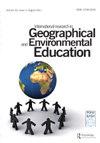如何评价地理信息系统在地理和环境教育中的应用?系统审查结果
IF 3.1
Q2 EDUCATION & EDUCATIONAL RESEARCH
International Research in Geographical and Environmental Education
Pub Date : 2022-11-10
DOI:10.1080/10382046.2022.2138167
引用次数: 2
摘要
摘要本研究对近十年(2010-2020年)关于地理信息系统(GIS)在地理与环境教育中的应用的30篇实证研究论文进行了文献综述。使用系统回顾方法,我们记录并综合了当前关于如何评估教育中地理信息系统使用的文献知识。研究结果表明,在过去十年中,用于评估GIS在教育中的使用的结构变量集中在三个主题类别(主题):学习(44.4%),情感元素(40.7%)和行为(14.8%)。一种经过认证的仪器被用于评估文章中30%的研究数据,而三种新的测量工具是由原始研究人员创建的。对调查结果的分析表明,地理信息系统在地理和环境教育中的使用是异质的、稀疏的和碎片化的。我们建议实施一个更系统的框架,以使未来的研究更有效。我们研究的价值在于,它提供了一个分析框架,可用于评估地理信息系统在教育中的使用,也可以提供有关发展新的评估方法和测量工具的信息。本文章由计算机程序翻译,如有差异,请以英文原文为准。
How is the use of GIS in geographical and environmental education evaluated? Findings from a systematic review
Abstract This study presents the findings from the literature review of 30 empirical research articles on the use of Geographic Information Systems (GIS) in Geographic and Environmental Education published in the last decade (2010-2020). Using systematic review methodology, we recorded and synthesized current knowledge from the literature on how the use of GIS in education is assessed. The findings show that over the past decade, the construct variables used to evaluate the use of GIS in education have focused on three thematic categories (Themes): Learning (44.4%), Affective Elements (40.7%), and Behavior (14.8%). A certified instrument had been used to evaluate the data of 30% of the research conducted in the articles, while three new measuring tools had been created by the original researchers. Analysis of the findings suggests that the use of GIS in Geographic and Environmental education is heterogeneous, sparse, and fragmented. We propose that a more systematic framework be implemented in order to make future studies more effective. The value of our study is that it provides an analytical framework which can be used when evaluating the use of GIS in education, and could also provide information on the development of new assessment methods and measuring tools.
求助全文
通过发布文献求助,成功后即可免费获取论文全文。
去求助
来源期刊

International Research in Geographical and Environmental Education
EDUCATION & EDUCATIONAL RESEARCH-
CiteScore
5.20
自引率
33.30%
发文量
11
期刊介绍:
International Research in Geographical & Environmental Education publishes quality research studies within the context of geographical and environmental education. The journal endeavours to promote international interest and dissemination of research in the field, provides a forum for critique, and demonstrates the relevance of research studies to good professional practice.
 求助内容:
求助内容: 应助结果提醒方式:
应助结果提醒方式:


